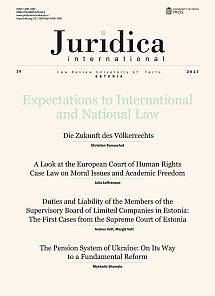Die Zukunft des Völkerrechts
DOI:
https://doi.org/10.12697/JI.2017.26.01Keywords:
Universal legal order, sovereign equality, self-determination of peoples and human rights, legitimacy and stability of international law, equal participation of newly independent states in law-creating processes, erosion of matters under exclusive national jurisdiction, agreement on issues essential for the survival of mankind, migrationAbstract
The international legal order today constitutes a truly universal legal system. It has received guiding principles through the United Nations Charter: ever since this ‘Constitution for the world’ began operating, sovereign equality of states, self‑determination of peoples, and human rights have been key components of this architecture, which has reached a state of ‘conceptual unity’ belying the talk of ‘fragmentation’ of international law that so fascinated scholars in their debates only a short while ago. The great peace treaties of 1648, 1815, and 1919, as Euro‑centric instruments influenced by the interests of the dominant powers, could not bring about a peaceful world order. After World War II, it was, in particular, the inclusion of the newly independent states in the legislative processes that has conferred an unchallenged degree of legitimacy on international law. Regrettably, its effectiveness has not kept pace with its normative growth. Some islands of stability can be identified. On the positive side, one can note a growing trend to entrust the settlement of disputes to formal procedures. Yet the integration of human rights in international law – a step of moral advancement that proceeds from the simple recognition that, precisely in the interest of world peace, domains of domestic and international matters cannot be separated one from the other as neatly as postulated by the classic doctrine of international law – has placed enormous obstacles before international law. It must be expected that the demand for more justice on the part of developing nations will subject the international legal order to even greater strain in the near future. Currently, chances are low that the issue of migration from the poorer South to the ‘rich’ North can be resolved.


